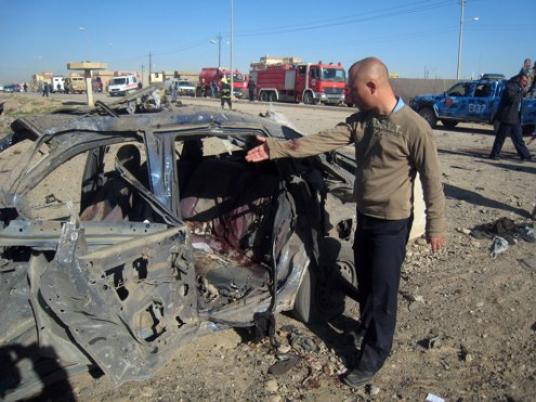
More than 20 bombs hit cities and towns across Iraq on Thursday, killing at least 36 and wounding almost 150, police and hospital sources said, raising fears of sectarian strife in a country whose authorities are keen to show they can now maintain security.
In Baghdad, three car bombs, two roadside bombs and one suicide car bomb hit mainly Shia areas, killing 15 people and wounding 61, the sources said.
Two car bombs and three roadside bombs aimed at police and army patrols in the northern oil city of Kirkuk killed eight people and wounded 26, police and hospital sources said.
"I was trying to stop traffic to let a police patrol pass … A car bomb exploded, I fell on the ground and police took me to the hospital," a policeman wounded in the face and chest told Reuters as doctors tended him. He declined to be named.
It was Iraq's bloodiest day since Al-Qaeda's affiliate in the country, the Islamic State of Iraq group, killed at least 52 people with a series of 30 blasts on 20 March.
No group has yet claimed responsibility for Thursday's attacks.
Colonel Dhiya al-Wakeel, a spokesman for the Baghdad operations command, said the attacks were an attempt to convince the Iraqi people that the country was still insecure.
"Our forces are capable of confronting such challenges and this will not affect the improvement in the security situation or our security plans," Wakeel told state-owned Iraqiya TV.
Heightened tension between Shias, Sunnis and Kurds in the coalition government since US troops withdrew in December has raised fears of a return to sectarian violence of the kind that pushed Iraq to the brink of civil war a few years ago.
The country is less violent than at the height of that conflict in 2006-07, but bombings and killings still happen daily, often aimed at Shi'ite areas and local security forces.
Kirkuk, home to Arabs, Kurds, Turkmen and others, is at the heart of a long-running dispute between the central government and the autonomous Kurdish region, which claims the city and the region's rich oil reserves.
Health minister targeted
Some critics say the government of Prime Minister Nuri al-Maliki is not doing enough to stem the threat from militants.
"They are saying they are changing security plans, they are redeploying troops but it is like they are changing the decorations only," Ali Al-Haidari, an Iraqi security expert, told Reuters.
"Is there any new technology, any new laws supporting the security process? The answer is no. The natural result for that is there are gaps here and there."
The biggest attack in Baghdad was in the Kadhimiya district, where a car bomb killed five and wounded 24, sources said.
A car bomb targeting the health minister's motorcade went off in the central Haifa district, killing two civilians and wounding at least four of the minister's guards, a police source said. His spokesman said five guards were wounded in the attack.
Car and roadside bombs also went off in Baghdad's Amil, Palestine Street and Zaafaraniya districts.
A political crisis erupted in Iraq in December when the Shia-led government tried to remove Sunni Deputy Prime Minister Saleh al-Mutlaq and sought an arrest warrant for Sunni Vice President Tareq al-Hashemi on charges he ran death squads.
Critics of Maliki viewed the moves as an attempt by the Shia premier to consolidate power, and many Sunnis fear he is trying to sideline them from government. Maliki has said the charges against Hashemi were brought by the judicial system.
Parliament speaker Osama al-Nujaifi said security force leaders should take responsibility for not stopping the explosions. "Some (groups) are seeking to exploit the domestic crisis to target unity and try to sow sectarian and racist strife," he said in a statement.
Elsewhere in northern Iraq, two car bombs targeting government-backed Sunni Sahwa militia went off in Samarra, two blasts hit Baquba, a roadside bomb exploded in Mosul and another roadside device exploded in Taji.
One policeman was killed in the town of Hadid, 10 km (6 miles) west of Baquba, when gunmen opened fire on the station where he worked from a passing car, police sources said.
In the mainly Sunni Muslim province of Anbar in the west, two car bombs targeting police killed four and wounded 10 in Ramadi while a roadside bomb wounded four people in Falluja.




